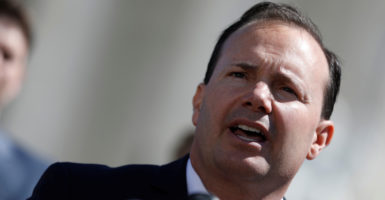The Congressional Budget Office significantly revised its estimate on how much repealing the individual mandate in Obamacare would reduce deficits in the federal budget.
“I feel like I’m trapped in a game of Calvinball,” Sen. Mike Lee, R-Utah, said in a statement. “Just a few months ago the CBO had us playing by one set of rules for debating health care policy and now we are being told those rules have been completely changed for tax policy. This is simply unacceptable.”
Earlier this year, CBO had said repealing the Obamacare mandate would reduce deficits by $416 million. In the revised estimate, released Wednesday, it predicted it would reduce the deficit by $338 billion.
Rep. Kevin Brady, R-Texas, said Friday that Republicans’ tax plan unveiled Nov. 2 could potentially include a repeal of the individual health care mandate in Obamacare.
CBO Director Keith Hall said the CBO would estimate that repealing the individual mandate in 2019 would “reduce federal budget deficits by $338 billion between 2018 and 2027 relative to CBO’s most recent baseline.” He also wrote on the agency’s website:
The agencies are in the process of revising their methods to estimate the repeal of the individual mandate. However, because that work is not complete and significant changes to the individual mandate are now being considered as part of the budget reconciliation process, the agencies are publishing this update without incorporating major changes to their analytical methods.
In December 2016, the CBO estimated that repealing the individual mandate and other provisions such as marketplace subsidies would reduce deficits in the federal budget by $416 billion between 2018 and 2026.
Lee said to counter the CBO’s lack of transparency, Congress must pass the CBO Show Your Work Act of 2017.
The bill, according to Lee’s office, would “require the CBO to publish its data, models, and all details of computation used in its cost analysis and scoring.”
The CBO would be able to retain its function as official scorekeeper of congressional budget proposals, however, “the American people and the economic community would be able to see what’s going on in all those spreadsheets and algorithms,” according to Lee’s office.
The bill, which Lee introduced in August, currently has 14 co-sponsors, including Sens. Roy Blunt, R-Mo.; Ben Sasse, R-Neb.; Tom Cotton, R-Ark.; Ted Cruz, R-Texas; Steve Daines, R-Mont.; Jim Inhofe, R-Okla.; Ron Johnson, R-Wis.; James Lankford, R-Okla.; Rand Paul, R-Ky.; David Perdue, R-Ga.; Jim Risch, R-Idaho; Pat Roberts, R-Kan.; Mike Rounds, R-S.D.; Marco Rubio, R-Fla.; and Roger Wicker, R-Miss.




























